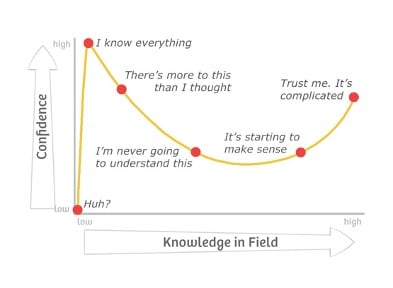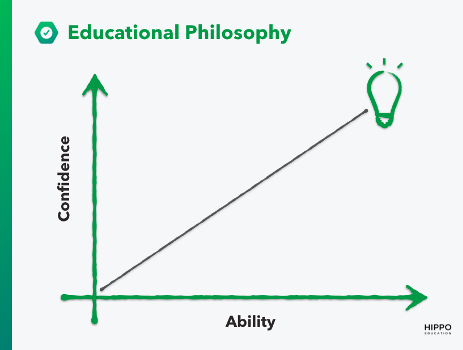Educational Philosophy: Confidence and Ability

What’s the secret sauce that makes Hippo Education’s urgent care products so popular with 150 provider networks and leading to a partnership with the Urgent Care Association?
It all starts with our educational philosophy.
The Dunning-Kruger Effect
In 1999, Drs. David Dunning and Justin Kruger introduced the world to the Dunning-Kruger Effect. When conducting an experiment on college students' estimates of their performance on tests, they found that students who performed poorly often had a falsely inflated sense of confidence about their ability. This can lead to poor decision-making and mistakes.
 Image attribution: Kruger Dunning Curve -- Erik De Haan
Image attribution: Kruger Dunning Curve -- Erik De Haan
Imposter Syndrome
Imposter syndrome is defined as “chronic feelings of self-doubt, the fear of being discovered as an intellectual fraud, a perception of being less intelligent or competent than peers, and an inability to internalize a sense of competence of skill in high-achieving individuals.”[1] As demonstrated in the Dunning-Kruger Effect, temporary self-doubt is a normal part of the process of gaining confidence. But the chronic self-doubt of imposter syndrome, something that is prevalent in the medical field, is a risk factor for burnout.
Taking Confidence and Ability To Urgent Care Education
At Hippo Education, we design our urgent care education to help overcome the Dunning-Kruger effect and avoid burnout.
 Every urgent care clinician falls somewhere on the line above. Anywhere other than high confidence and high ability can predispose to burnout in urgent care, a setting with high demands and high patient volumes. Many clinicians have fallen outside of that high confidence, high ability state at some point, especially during the transition points in their career (eg, just starting out in practice, moving jobs). Reaching a point of high confidence and ability is important for job satisfaction, which has a ripple effect on patient outcomes and productivity.
Every urgent care clinician falls somewhere on the line above. Anywhere other than high confidence and high ability can predispose to burnout in urgent care, a setting with high demands and high patient volumes. Many clinicians have fallen outside of that high confidence, high ability state at some point, especially during the transition points in their career (eg, just starting out in practice, moving jobs). Reaching a point of high confidence and ability is important for job satisfaction, which has a ripple effect on patient outcomes and productivity.
A little guidance and the right tools go a long way to increasing a clinician’s confidence and ability. In our Urgent Care Bootcamp onboarding product, we are honest about our own insecurities as new clinicians. This helps normalize the initial feelings of self-doubt early in our careers. Through assessment products, we help clinicians gain a better understanding of their weak areas. We provide educational opportunities to shore up those weaknesses so they can move to an area of high confidence and high competence quicker. This leads to better retention of clinicians, as evidenced by Dr. Roger Wu, National Medical Director at Carbon Health. Carbon Health has a very high level of clinician retention, thanks in part to utilizing Hippo Education’s urgent care products.
“Our retention rate is over 95 percent, and one of the biggest factors is the attention we put into education and career development. When clinicians are happy and fulfilled, patients experience better outcomes. It becomes a positive reinforcing feedback loop that supports growth.” - Dr. Roger Wu
Check out https://home.hippoed.com/uca to explore all of the urgent care products Hippo Education has to offer.
References:
1Clance PR, Imes SA. The imposter phenomenon in high achieving women: Dynamics and therapeutic intervention. Psychotherapy: Theory, Research & Practice. 1978;15(3):241–247. https://psycnet.apa.org/record/1979-26502-001
Chen C. Doctor who? Reflecting on impostor syndrome in medical learners. Can Fam Physician. 2020 Oct;66(10):e268-e269.
Rahmani M. Medical Trainees and the Dunning-Kruger Effect: When They Don't Know What They Don't Know. J Grad Med Educ. 2020 Oct;12(5):532-534. https://www.ncbi.nlm.nih.gov/pmc/articles/PMC7594774/
Practice-Changing Education
Experience education that goes beyond theory. Explore Hippo Education’s offerings below.



